Dundee United have enjoyed a successful second season back in the Scottish Premiership following several seasons out of Scotland’s top flight.
Rookie manager Tam Courts has guided United to a top-six place and a shot at qualification for next season’s Europa Conference League — their first involvement in European competition since 2012/13.
A good blend of experience and emerging academy talent has helped United to their strong season, but Welsh midfielder Dylan Levitt has caught the eye most of all for Courts’ side.
On a season-long loan from Manchester United, the 21-year-old has enjoyed a productive spell in Scotland following two relatively unsuccessful loan periods last season, firstly with EFL League One side Charlton and then Croatian side NK Istra.
Already a full international with Wales, Levitt is a playmaking central midfielder who has played both as an ‘8’ and a ‘6’ in Dundee United’s two main formations this season, 4-3-3 and 3-5-2.
3-5-2 has been United manager Courts’ favoured system, particularly in the second part of the season with Levitt operating either in the central midfield role, tasked with building play from a deep, or from the LCM/RCM position where he has more of a responsibility to support the attack.
A technically gifted player, Levitt’s vision, range of passing and habit for producing spectacular strikes have played a key role in Dundee United’s success this season.
In this analysis, we will take a closer look at Levitt’s playing style and the attributes that will make him a player in demand this summer.
Player profile
First, we will look at Levitt’s data for Dundee United in 2021/22. The below pizza chart shows his percentile rank compared to other central midfielders in the Scottish Premiership.
Divided into three sections, attacking, possession and defending, we can start to build a picture of the type of player Levitt is.
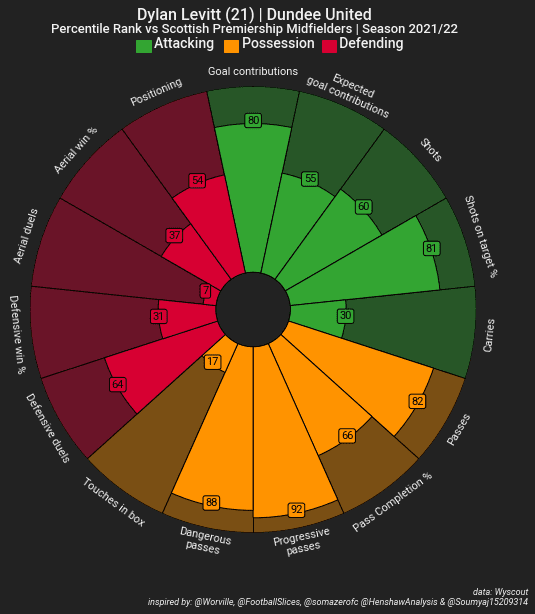
His ranks for possession metrics are impressive, ranking highly for volume of passes per 90 and scoring an above-average completion rate rank. His ranks for progressive passes and dangerous passes (combination of key passes and through passes) are particularly impressive, especially for a side outside the big two of Celtic and Rangers.
His goal threat comes through in the attacking section with a high score for goal contributions, with a lower rank for expected goal contributions reflecting his strikes from distance.
On defending, he scores above average for positioning (combination of shots blocked and PAdj Interceptions). In duels, he has just above average for defensive duels, and just below for aerial duels. His success rates for both are relatively low.
Looking at his heatmap for this season, we can see he is active across the base of midfield when playing in ‘6’ as well as in half-spaces in the opposition half, on both the left and right.
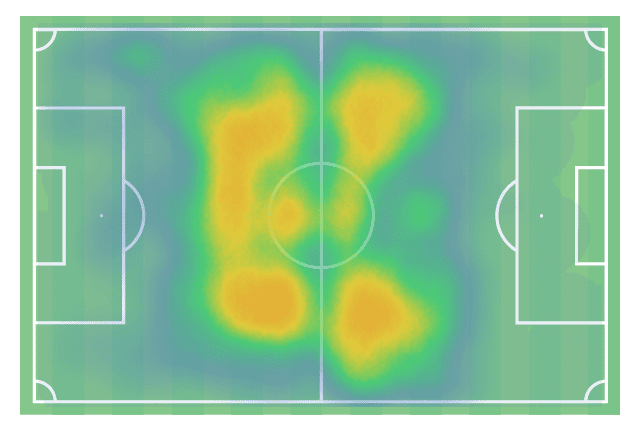
Passing
Levitt is an incisive passer, capable of building attacks from deep where he keeps the ball moving at a good pace taking minimal touches.
As the data profile showed, he is a high-volume passer, attempting more passes (45.4 per 90) than any of his United teammates this season.
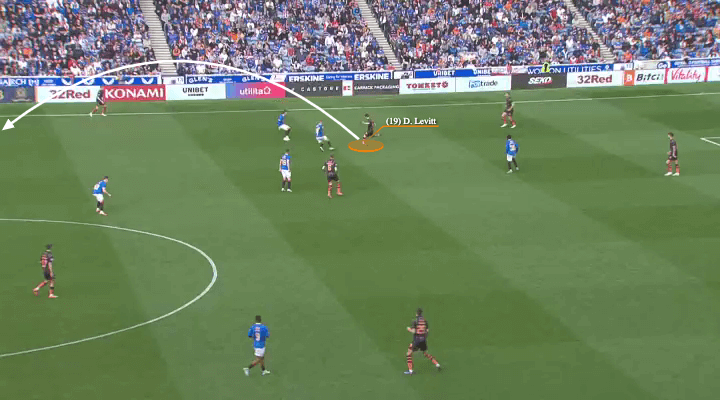
Capable of playing off either foot, Levitt has excellent balance, rarely looking rushed in possession. In this first example, we see Levitt dropping deep to receive the ball from the centre back in Dundee United’s game at Ibrox towards the end of the season.
Despite Rangers players’ pressing aggressively, Levitt is composed, quickly shifting his body weight to turn and face up the pitch. He then picks out a teammate down the channel, relieving pressure and giving United possession in the final third.
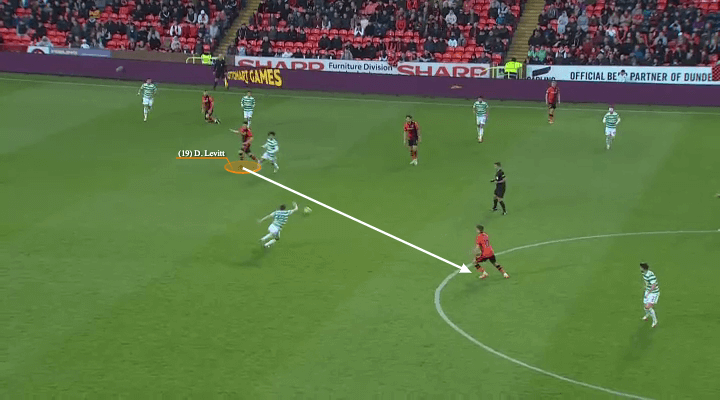
His excellent vision means he can progress the ball with creative line-breaking passing, as seen in this next example. Again, he shows good composure despite pressure and a player attempting to block off the passing lane to pick a pass which breaks Celtic’s line and gets United up the park.
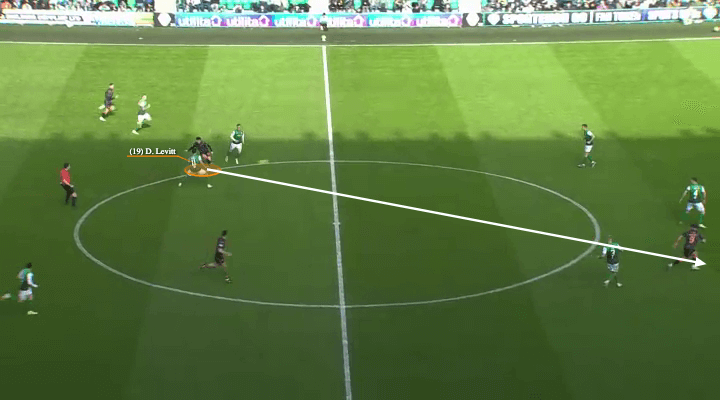
Here, we see another example of Levitt’s impressive passing game, again he shows great vision to spot the through ball which he executes to put his teammate in behind the opposition defence.
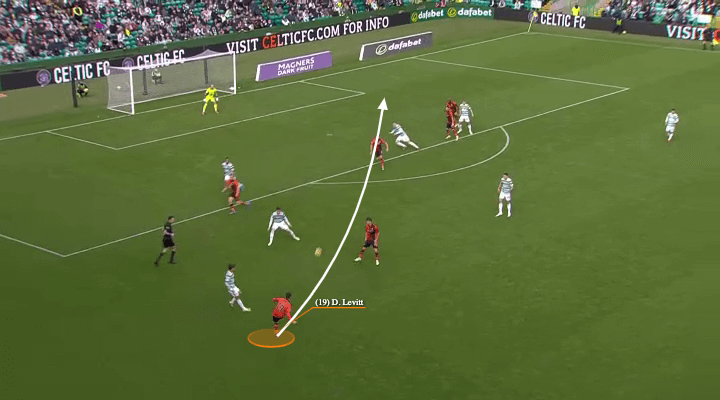
In this game from earlier in the season, we can see an example of Levitt’s long-range passing. With a lack of pressure on him, he finds himself in the left half-space with time to cross deep to the back post where United have created an overload.
He executes a measured, bending pass to take the Celtic centre back on that side out of the game, creating a high-quality goalscoring opportunity on the edge of the six-yard box.
Shooting
Levitt has bagged seven goals in all competitions for United this season — most of them outside the box — with his equalising strike against Celtic in their final home game of the season potentially the pick of the bunch.
As we saw in his data profile, he is just above average for the number of shots attempted per 90, ranking highly for the percentage he gets on target.
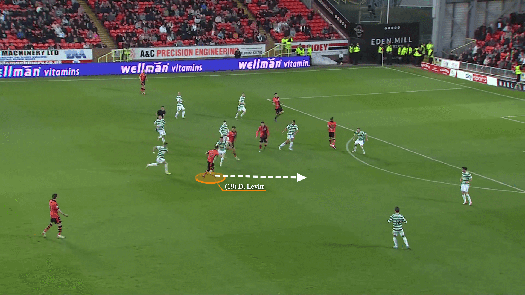
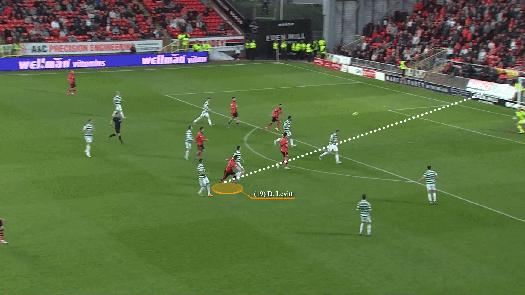
The above stills show Levitt setting himself up for the recent strike against Celtic, showing excellent skill by executing a ball roll with his left to create space away from midfielders who are closing in and get onto his stronger right foot, something he previously produced earlier in the season, but from his right onto his left, for his match-winning goal away at Kilmarnock in the Scottish Cup. Here, as with his goal at Kilmarnock, Levitt cleanly strikes through the ball, directing it into the side netting.
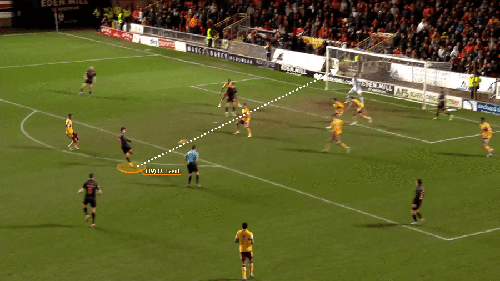
Another example of his clean ball-striking from earlier in the season against Motherwell is shown above. This time Levitt shows fantastic technique and great timing to strike the ball on the half volley from the edge of the box. As with his goal against Celtic, his placement is accurate, into the far corner of the net, well out of reach of the goalkeeper.
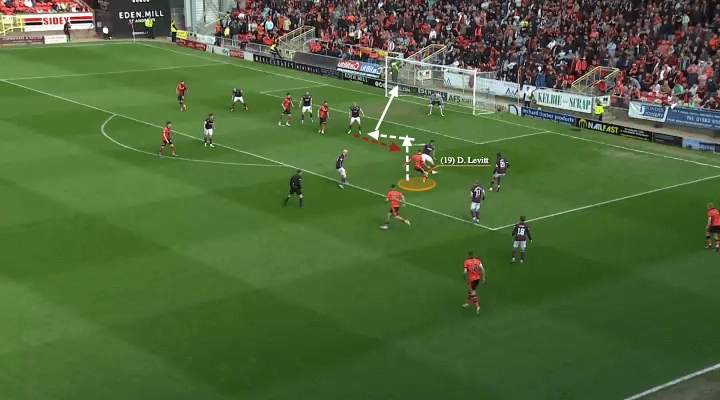
As we have seen his quick feet allow Levitt to create that extra yard that gives him time to measure his strikes. This was very much evident in his brilliant solo goal against Hearts. In this example, Levitt receives the ball much closer to the goal, just inside the box.
Again, he produces a fantastic piece of skill to nutmeg the first Hearts defending before showing excellent balance and quick feet to quickly move the ball from his right foot onto his left to beat the second covering defender. This opens up the left side of the goal and Levitt calmly slots the ball into the bottom corner.
Defending
Although his primary role in United’s system is to get on the ball and progress play, Levitt still has defensive responsibilities, an area where he still has room for improvement.
He is not the most physical, something Charlton manager Lee Bowyer attributed to his struggles in League One during his loan last season, which can lead to him being outmuscled in the middle of the park at times.
He is certainly not aggressive when it comes to the defensive side of the game, but he is hardworking and quick across the ground which sees him contribute his share of interceptions, as we saw in his data profile.
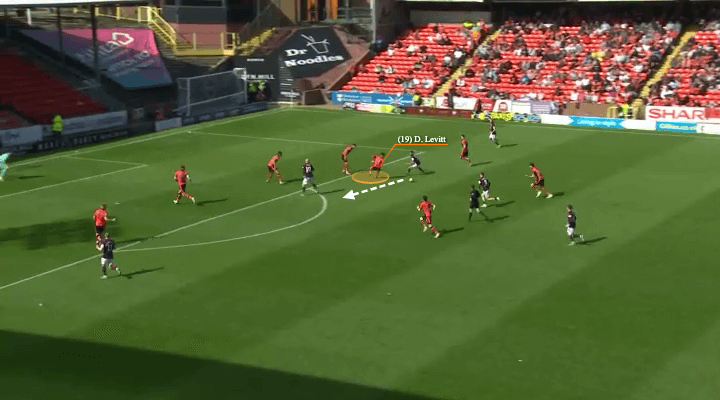
One defensive area he could improve would be defending in 1v1 situations. For example, in the above, he is tracking the wide Hearts player who is driving towards the goal on the inside right channel. He does well to force him wider of the goal initially but he isn’t quite tight enough and his body shape allows the Hearts player to attack back inside and open up space on the edge of the box.
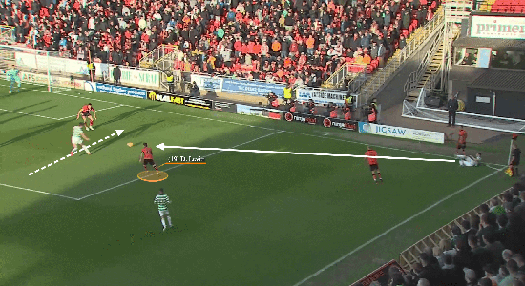
The next example shows a situation where Levitt could still improve his defensive awareness, again he does well initially, scanning twice to see where the Celtic midfield runner is but he then switches off for a second, slowing up as the pass is played from wide. He is then unable to cut out the low cross which finds the Celtic player in behind, leading to a dangerous attack inside Dundee United’s box.
Conclusion
With his loan at Dundee United over, and his contract at Manchester United expiring this summer, Levitt will be available for a free transfer.
Tam Courts’ has already publicly stated his desire to keep hold of Levitt, but there will likely be several clubs lining up to add the Welshman to their squads for next season.
English Championship and League One side will certainly be monitoring his progress with Dundee United unlikely to compete with the wages Levitt could be offered to move back down south.
What we do know is that whichever club picks up Welshman this summer will get a classy operator who can control games, contribute goals from midfield and still has the potential to improve.

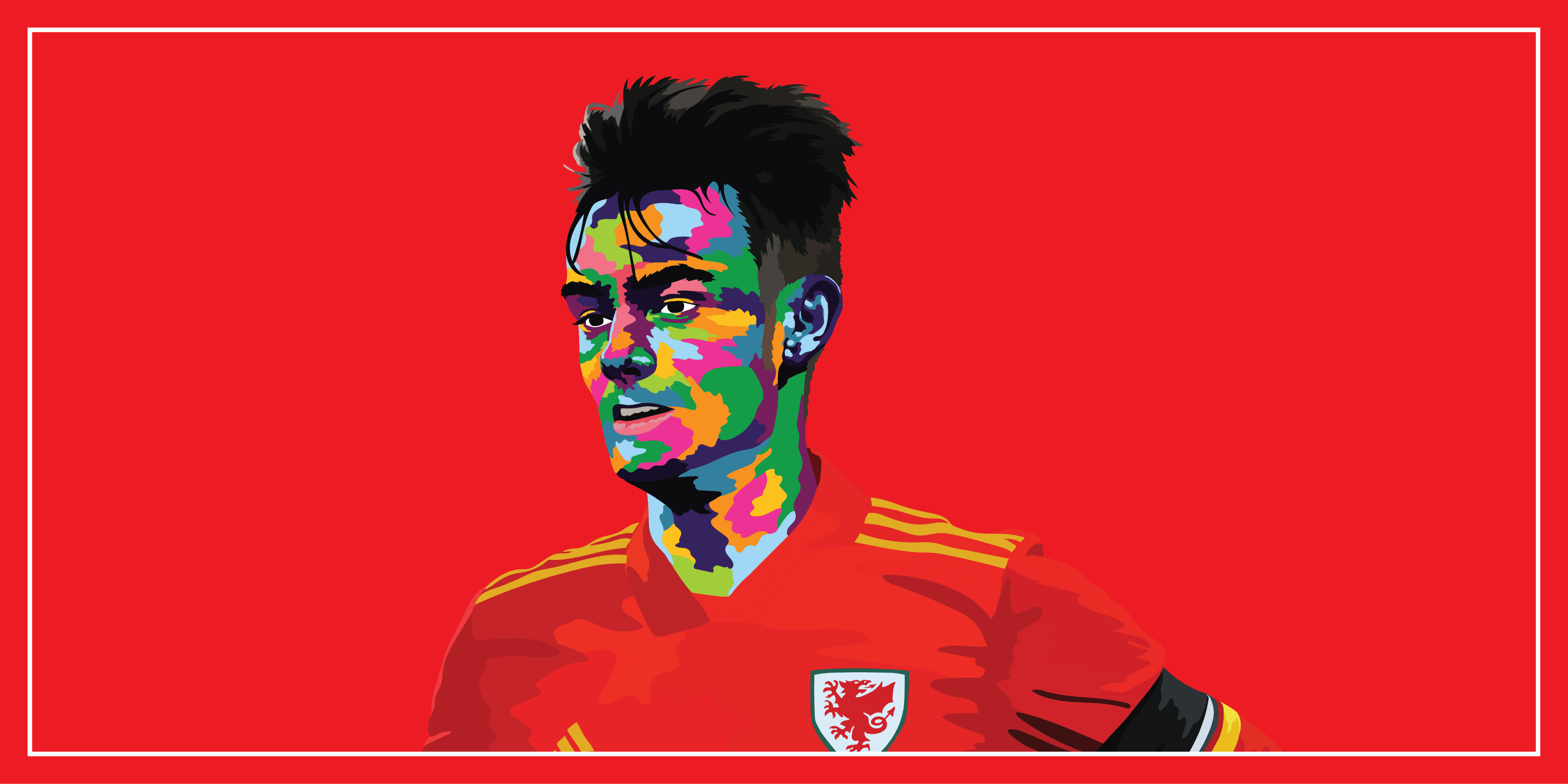



Comments